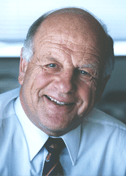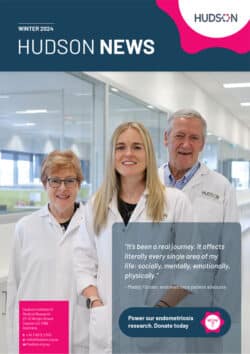Professor Henry Burger AO, FAA MD BS FRCP FRACP FCP (SA) FRCOG FRANZCOG Hon.Doct (Liege, Belgium), LL.D (h.c. Monash), Director Emeritus
- Distinguished Scientist, Hudson Institute
Professor Henry George Burger AO FAA FAHMS
1933-2024
Professor Burger was a Director Emeritus of Hudson Institute, and previously Prince Henry's Institute, after his long tenure as Director of Prince Henry's Hospital Medical Research Centre/PHI from 1969-1992. He was a valued Distinguished Scientist of the Centre for Endocrinology and Metabolism.

Biography
Professor Henry Burger was an eminent scientist and clinician, with a distinguished career in medical research. He was a world-renowned leader in endocrinology and women’s health. Until mid-2014, he was a practising clinical endocrinologist with a particular interest in reproductive endocrinology.
Professor Burger took up the directorship of the Medical Research Centre at Prince Henry’s Hospital in 1969 and was Director of Prince Henry’s Institute (PHI, a predecessor of Hudson Institute of Medical Research) from 1990-1998. He then held the position of Emeritus Director, Hudson Institute, and continued to collaborate with various researchers on projects including research on menopause.
Professor Burger had a long history working in the area of the gonadal hormone inhibin, leading to its purification and cloning, and subsequent exploration of its physiology. He conducted basic and clinical studies in the physiology of pituitary hormones and gonadal steroids, and the biology of the fertile period. His research and clinical interests included the physiology of the menopause and management of the menopause transition, anovulatory infertility, hirsutism, male infertility and female sexual dysfunction. Together with the late Dr Jean Hailes AM, Professor Burger established Australia’s first menopause clinic at Prince Henry’s Hospital in 1971.
He published over 600 papers, edited numerous books and was an invited speaker at over 180 national and international conferences throughout his long and distinguished career.
Professor Burger left an enduring legacy marked by his dedication, intellectual rigor, and compassion for others. His generosity is recognised through the establishment of the Henry G. Burger Clinical Endocrinology Research Fellowship in 2019, which supports an emerging leader in the Centre for Endocrinology and Metabolism through a two-year postdoctoral fellowship.
Notable Achievements:
- 1971 – Co-established Australia’s first menopause clinic at Prince Henry’s Hospital
- 1990 – Received Honorary Fellowship, Royal Australian College of Obstetricians and Gynaecologists (ad eundem)
- 1993 – Awarded Officer in the General Division of the Order of Australia (AO)
- 1994 – Elected to Fellowship of the Australian Academy of Science (FAA)
- 1997 – Received the Dale Medal, the highest accolade bestowed by the Society of Endocrinology, UK
- 1998 – Elected to Fellowship of the Royal College of Physicians, London
- 1999 – Received the Distinguished Physician Award of the US Endocrine Society
- 1999 – Received an Honorary Doctorate, University of Liege, Belgium
- 2000 – Awarded the NAMS/Wyeth Ayerst Peri-menopause Research Award; this award recognises an individual whose published works have served to increase understanding of clinical management of health issues pertaining to peri-menopausal women
- 2002 – Received an Honorary Fellowship, the Royal College of Obstetricians & Gynaecologists (ad eundem)
- 2003 – Awarded the Centenary Medal for service to Australian society and science in endocrinology
- 2005 – Appointed as an Honorary Member, Society for Endocrinology, UK
- 2006 – Awarded the NAMS/Procter and Gamble Pharmaceuticals Morrie M. Gelfand Leadership Award in Androgen Research; this award recognises an individual whose body of research over his/her lifetime has advanced the understanding of the role of androgens (endogenous or exogenous) in postmenopausal women
- 2014 – Received an Honorary Doctorate of Laws, Monash University
- 2015 – Elected to Fellowship of the Australian Academy of Health and Medical Science (FAHMS)
- 2017 – Awarded a Doctor of Medical Science honoris causa, The University of Melbourne; this award is bestowed on individuals who have made significant contributions to the field of medical science and to society
Publication highlights


